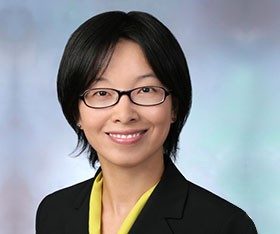Li Guo, Ph.D./J.D.

Li Guo
Associate, Steptoe & Johnson LLP
B.S., Applied Chemistry, Peking University
Ph.D., Chemistry, University of Rochester
J.D., The George Washington University
Li Guo attended graduate school at the University of Rochester, where her research focused on nanotechnology, including the preparation, characterization, and application of semiconductor nanocrystals. Following graduate school, she obtained her first job as a design engineer by attending a career fair.
Soon, Guo started thinking about taking her career in a new direction. Specifically, she wanted a career where she would not have to spend as much of her time in a lab, yet could still use her technical background and experience. After discussing her preferences with many friends and colleagues, she learned that patent law might be a good match. She decided to pursue a law degree part time while working as a policy and intellectual property specialist.
Guo completed her research and thesis defense in 2007, and received the official diploma in 2008. She has been working at Steptoe & Johnson LLP since May 2012, first as a summer associate, then as a law clerk, and currently as an associate.
One need not become an attorney before beginning a career in patent law. Many law firms hire scientists or engineers as technical specialists or patent agents to perform many of the same duties as patent attorneys.
Primary job responsibilities:
My current responsibility focuses on patent prosecution and patent litigation. Patent prosecution includes drafting patent applications and responding to office actions. An office action is a document issued by a patent examiner, giving reasons why the examiner has allowed and/or rejected the claims. Patent litigation often involes patent infringement -- typically an unpermitted act with respect to a patented invention. Additional responsibilities I’ve had include conducting patentability searches to assess whether an invention is patentable, conducting legal research relating to patent infringement, and other patent-related projects.
Typical day on the job:
I spend the majority of my day reading and writing. For example, if I am drafting a patent application, I may spend time reading through a lot of disclosures and documents from the client. Or, if I am to conduct legal research to support legal decision making, my time can be spent finding and analyzing cases, statutes, and other relevant authorities.
Work environment:
I have my own office, with equipment typical of most offices, such as computers, printers, copiers, scanners, etc. I’ve found Steptoe to be a very nice work environment.
Work schedule:
The hours required in a law firm are often referred to as billable hours, which are generally the hours the client gets charged at an agreed-upon hourly rate. Generally, there’s a required minimum level of billable hours, often ranging from 1800 to 2000 hours a year. It typically takes at least 50 hours a week in the office to bill 40 hours, adding bathroom breaks, lunch, and some socializing.
Travel schedule:
I am not required to travel.
Tools you can’t live without:
Word, PowerPoint, and Excel.
What you like most about your job:
Patent law is an exciting area of practice. Still using my technical background and research experience, I get to work at the interface of technology and law, where science meets society. In addition, patent attorneys have the opportunity to work in technical areas beyond their original specialty. I’ve worked on patents involving technologies in different fields, including nanotechnology, chemistry, chemical engineering, material science, optics, mechanical engineering, physics, and biotechnology.
Best productivity trick:
Organize and prioritize. If there is a large complicated project, it helps to break it into smaller pieces to prioritize, organize, and have the satisfaction of finishing things along the way.
Best career advice you’ve received:
Don’t stop learning. “There is something to be learned every day, both by looking in the mirror at yourself and by looking at the people around you.” A career is a never-ending process of skill and character development. Whether you fail or succeed, take everything that happens as an opportunity to learn.
One need not become an attorney before beginning a career in patent law. Many law firms hire scientists or engineers as technical specialists or patent agents to perform many of the same duties as patent attorneys. Another option is to become a patent examiner at the U.S. Patent and Trademark Office (USPTO), which can be a short-term or long-term career opportunity for a graduate having a degree in science or engineering.
Skills or talents that make you a good fit for your job:
Technical, writing, and communication skills are important. Patent prosecution demands considerable technical knowledge. My technical background and research experience help me understand the subject to be patented, draft a patent that covers a proper scope of the invention and if necessary, rebut the grounds for rejection from the patent office. And, of course, good writing skills are a necessity for any lawyer. In addition, our job is not limited to obtaining patent protection, but also involves communicating with clients to guide them through the patenting process and, ultimately, advance their businesses.
Essential habit you wish you’d started earlier:
I wish I had been a more active member of a professional organization much earlier and had spent more time networking. Making connections early and building mutually beneficial relationships can be important for long-term career development. Relationships can be key to success – people do business with those they like and trust.
Favorite ACS resource:
Chemical & Engineering News. Since I don’t work in the lab anymore, the magazine helps me stay in touch with the chemical world, providing information in the scientific, technological, educational, business, and governmental aspects of chemistry.
How you've benefited from being an ACS member:
I benefited from being an ACS member by participating in ACS Meetings, having access to ACS journals, and being part of a large professional network.

